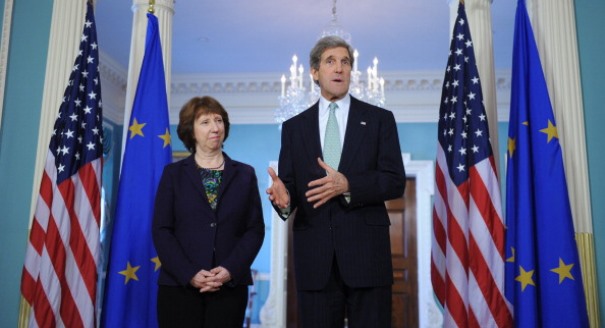The first foreign trip of a newly appointed U.S. secretary of state carries a particular message. In March 2009, Hillary Clinton chose Asia as the destination of her maiden voyage; she later became one of the driving forces behind the U.S. “pivot” to Asia.
Now, John Kerry has traveled to Europe on his first foreign trip in office. It seems that Washington is acknowledging that Europe is not just a sentimental memory, but holds some importance for the future.
Geostrategic adjustments don’t happen out of the blue. Before the United States announced its pivot to the Asia-Pacific region in 2011, outgoing Secretary of Defense Robert Gates warned Europeans: “Future U.S. political leaders—those for whom the Cold War was not the formative experience that it was for me—may not consider the return on America’s investment in NATO worth the cost.”
And wasn’t it a natural move for America to disengage from Europe and its neighborhood, with the Cold War over and Europe largely free and united, ready to take care of itself?
Robert Gates’s call on Europeans to spend more on defense fell on deaf ears. Their commitment to NATO remains purely rhetorical. Instead of investing in NATO, Europeans continue to cut their defense budgets. The old NATO-centered transatlantic alliance is being hollowed out by the disinterest of its major stakeholders.
But, at the same time, we may be witnessing the birth of a new partnership. In his State of the Union speech, Obama endorsed the project of a transatlantic marketplace, the Transatlantic Trade and Investment Partnership (TTIP). This new alliance would be built not on Cold War romanticism, but on tangible economic and strategic interests.
The economic case for the TTIP—formerly known as TAFTA (Transatlantic Free Trade Area)—is overwhelming. The annual growth triggered by a comprehensive agreement is estimated at between 0.5 and 2 percent of GDP for both partners.
But there is much more to it. The TTIP also holds the promise of geopolitical clout at a time when other power centers are emerging around the world. If both sides manage to overcome the many obstacles to the TTIP, the pact could restore the normative power of what geostrategists like Thomas P.M. Barnett have branded “the core:” Europe and the United States as the heartlands of liberal democracy.
The emergence of an integrated transatlantic marketplace could strengthen this core in many ways. First, enhanced economic growth would help the United States and Europe to keep their status as leading economies. Second, the TTIP would create a new political dynamic between Americans and Europeans. The need to constantly coordinate and cooperate on economic policies would bring policymakers from both sides much closer together. This, in turn, would make cooperation in other fields easier and more likely.
Third, agreed standards on transatlantic goods and services, which represent 40 percent of global GDP, would have a good chance of becoming global norms. Fourth, the TTIP would prove the advantages of economic openness, making protectionism a much less attractive option, both inside and outside the TTIP area. Fifth, a successful transatlantic marketplace would confirm the superiority of economic and political liberalism as an organizing principle for modern societies.
The risk, however, is that these negotiations may lead to a backlash from third countries. Inevitably, the TTIP will be seen to be targeting China: a defensive move by a declining West to hedge against China’s rise.
Others may feel excluded as well. And they have a point. The TTIP can only become a strategic success if it is conceived as a first step toward a broader and more integrated global marketplace. The goal must be to build not a bloc, but a framework, open to any country willing to sign up to its principles.
The strategic challenge for Americans and Europeans in the twenty-first century is to find ways to share wealth and power without sacrificing the principles that have made the accumulation of wealth and power possible: the institutions of market economy and liberal democracy. The TTIP could, if properly handled, become a key element in this transfer of power.



-1.png)

-2.png)
